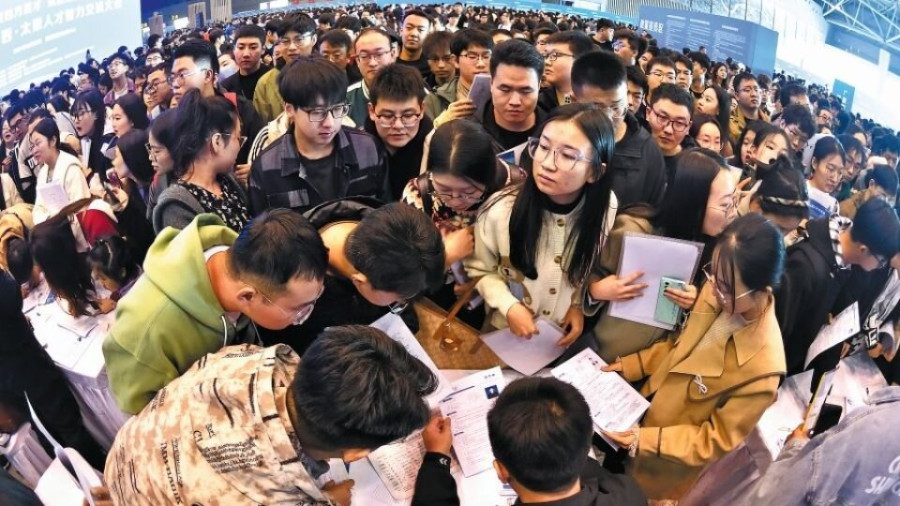World
In China, AI creates more jobs but with higher entry threshold
Positions related to natural language processing increased 111 per cent year-on-year in the first six months on Zhaopin, while those related to deep learning increased 61 per cent. The average monthly salary for these jobs was around 24,000 yuan ($3,370).
China Daily
As artificial intelligence continues to make headlines, Chinese internet companies are busy scouting for talent that can take them to the forefront of this transformational technology. The domestic job market is in the process of adapting to this new environment, which in turn is raising the eligibility threshold for job seekers, experts said.
A joint report released recently by Peking University’s National School of Development and recruitment portal Zhaopin shows that AI-related job openings surged in the first half of the year.
Positions related to natural language processing increased 111 percent year-on-year in the first six months on Zhaopin, while those related to deep learning increased 61 percent. The average monthly salary for these jobs was around 24,000 yuan ($3,370).
Hu Jiayin, an associate professor at the National School of Development, noted that it is not easy to get AI-related jobs, because they have higher entry threshold.
“Several positions related to natural language processing and deep learning have higher requirements in terms of education and work experience. The eligibility criteria have been rising, so it’s necessary to get higher education degrees and richer work experience if job seekers wish for employment in the AI sector,” she said.
In 2022, United States-based OpenAI’s chatbot ChatGPT and other large language models — AI systems that are capable of comprehending and generating human language by processing vast amounts of text data — caught the domestic job market off guard.
The massive influence of AI has already reduced some clerical and customer service-based positions, Zhaopin said, and the joint report concluded that job seekers must continuously improve their skill set in order to remain competitive in the rapidly changing employment market.
Another report, released by the World Bank earlier this month, also mentioned the impact of AI on jobs, particularly in East Asia and the Pacific region.
“Displacement effects are beginning to be felt in occupations involving primarily routine cognitive tasks that involve standard optimization and low social interaction, and gradually to occupations involving nonroutine cognitive tasks,” the World Bank report said.
“Malaysia and China stand out as countries with a relatively high share of people employed in nonroutine cognitive tasks who may be equipped to benefit from complementarities with AI,” it added.
Xu Yifan, 27, a postgraduate student at Shanghai University of Engineering Science, said he is optimistic about a career in the AI sector because he is focusing on the research of federated learning, a state-of-the-art AI tool mainly used in data security and distributed data processing.
“It’s undeniable that fast-developing AI technologies have greatly shocked traditional industries and the job market. I think the knowledge and skills I’ve acquired, especially in federated learning, will work to my advantage. AI is not just a technology-driven innovation tool, it is also a force reshaping society and the economy,” he said.
Xu said that to cope with the ever-changing revolution brought by AI, it is necessary for him to keep learning. “New algorithms, tools and applications come up all the time, which require us to be learners for life. A certain single skill will not work forever, so we need to train ourselves to be all-arounders, combining AI knowledge with other skills to foster competitiveness in such a complicated job market,” he added.
Li Qiang, vice-president of Zhaopin, said that job seekers need to be more flexible and have the ability to keep learning new things, in order to adjust to a life and career based on AI.
“It is important for people to be sensitive to AI-related knowledge and development and to embrace the integration of such knowledge with their current professions, such as healthcare or finance,” Li said.
“Learning some soft skills that AI lacks, such as teamwork and communication, and becoming involved in or leading some AI projects to gain more practical experience, if possible, would also be beneficial,” he added.
Hu, from Peking University, emphasized that no job seeker or employee could be a bystander in the AI storm. For average employees, it’s important to learn to use some AI tools while enhancing soft skills, including their ability to innovate, organize and communicate, she said.
-In Association with ANN




 31.12°C Kathmandu
31.12°C Kathmandu















